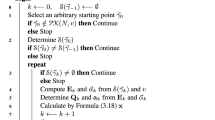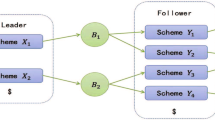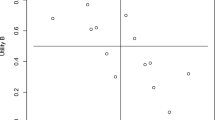Abstract
In this paper, we consider a linear complementarity problem (LCP) arisen from the Nash and Arrow–Debreu competitive economy equilibria where the LCP coefficient matrix is symmetric. We prove that the decision problem, to decide whether or not there exists a complementary solution, is NP-complete. Under certain conditions, an LCP solution is guaranteed to exist and we present a fully polynomial-time approximation scheme (FPTAS) for approximating a complementary solution, although the LCP solution set can be non-convex or non-connected. Our method is based on approximating a quadratic social utility optimization problem (QP) and showing that a certain KKT point of the QP problem is an LCP solution. Then, we further show that such a KKT point can be approximated with a new improved running time complexity \({{O}((\frac{n^4}{\epsilon})\log\log(\frac{1}{\epsilon}))}\) arithmetic operation in accuracy \({\epsilon \in (0,1)}\). We also report preliminary computational results which show that the method is highly effective. Applications in competitive market model problems with other utility functions are also presented, including global trading and dynamic spectrum management problems.
Similar content being viewed by others
References
Arrow K., Debreu G.: Existence of an equilibrium for competitive economy. Econometrica 22, 265–290 (1954)
Barany, I., Vempala, S., Vetta, A.: Nash equilibria in random games. In: Proceedings of the 46th Annual IEEE Symposium on Foundations of Computer Science, pp. 123–131 (2005)
Brainard, W., Scarf, H.: How to compute equilibrium prices in 1891. Cowles Foundation Discussion Paper, 1270 (2000)
Burress D.: Homeomorphism between Leontief and Cobb-Douglas input-output models. Econ. Lett. 44, 49–53 (1994)
Chen, X., Deng, X., Teng, S.: Computing nash equilibria: approximation and smoothed complexity. In: 47th Annual IEEE Symposium on Foundations of Computer Science, pp. 603–612 (2006)
Codenotti, B., Saberi, A., Varadarajan, K., Ye, Y.: Leontief economies encode nonzero sum two-player games. SODA. Theor. Comput. Sci. (2006)
Cottle R., Pang J.S., Stone R.E.: The Linear Complementarity Problem. Academic Press, Boston (1992)
Dang C., Ye Y., Zhu Z.: An Interior-point Path-following Algorithm for Computing a Leontief Economy Equilibrium. Technical Report, Stanford University, Stanford (2008)
Daskalakis, C., Goldberg, P.W., Papadimitriou, C.H.: The complexity of computing a Nash eqilibrium. In: Proceedings of the 39th Annual ACM Symposium on Theory of Computing, pp. 71–78 (2006)
Gilboa I., Zemel E.: Nash and correlated equilibria: Some Complexity Considerations. Games Econ. Behav. 1, 80–93 (1989)
Horn R.A., Johnson C.R.: Matrix Analysis. Cambridge University Press, Cambridge (1985)
Kojima M., Mizuno S., Yoshise A.: A polynomial-time algorithm for a class of linear complementarity problems. Math. Program. 40, 1–26 (1989)
Lemke C.E.: On complementary pivot theory. In: Dantzig, G.B., Veinott, A.F. (eds) Mathematics of Decision Sciences, Part 1, pp. 95–114. American Mathematical Society, Providence (1968)
Luo, Z.Q., Pang, J.S.: Analysis of iterative waterfilling algorithm for multiuser power control in digital subscriber lines. EURASIP J. Appl. Signal Process. 24012 (2007)
Moré J.J.: The Levenberg–Marquardt algorithm: implementation and theory. In: Watson, G.A. (eds) Numerical Analysis, Springer, New York (1977)
Murty K.G., Kabadi S.N.: Some NP-complete problems in quadratic and nonlinear programming. Math. Program. 39, 117–129 (1987)
Papadimitriou, C.H.: On the complexity of the parity argument and other inefficient proofs of existence. J. Comput. Syst. Sci. 48 (1994)
Proakis J.G.: Digital Communications. McGraw-Hill, New York (1995)
Tsaknakis H., Spirakis P.: An Optimization Approach for Approximate Nash Equilibria. Lect. Notes Comput. Sci. 4858, 42–56 (2007)
Walras, L.: Elements of Pure Economics, or the Theory of Social Wealth. (1874) (1899, 4th ed., 1926 rev ed., 1954, Engl. Transl.)
Xie, Y., Armbruster, B., Ye, Y.: Dynamic Spectrum Management with the Competitive Market Model. Technical Report, Stanford University, Stanford, IEEE Trans. Signal Process. (2008)
Ye Y.: Market Equilibria with Leontief’s Utility: Freedom of Pricing Leads to Rationality. WINE 2005 Theor. Comput. Sci. 378(2), 134–142 (2007)
Ye Y.: On the complexity of approximating a KKT point of quadratic programming. Math. Program. 80, 195–212 (1998)
Ye Y.: Competitive Communication Spectrum Economy and Equilibrium, Technical Report. Stanford University, Stanford (2008)
Yu, W., Ginis, G., Cioffi, J.: Distributed multiuser power control for digital subscriber lines. IEEE Journal on Selected Areas in Communications. 20 (2002)
Author information
Authors and Affiliations
Corresponding author
Additional information
Research was supported in part by NSF grant DMS-0604513 and AFOSR grant FA9550-09-1-0306. Z. Zhu was supported by a Henry Fan Stanford Graduate Fellowship.
Rights and permissions
About this article
Cite this article
Zhu, Z., Dang, C. & Ye, Y. A FPTAS for computing a symmetric Leontief competitive economy equilibrium. Math. Program. 131, 113–129 (2012). https://doi.org/10.1007/s10107-010-0348-8
Received:
Accepted:
Published:
Issue Date:
DOI: https://doi.org/10.1007/s10107-010-0348-8




